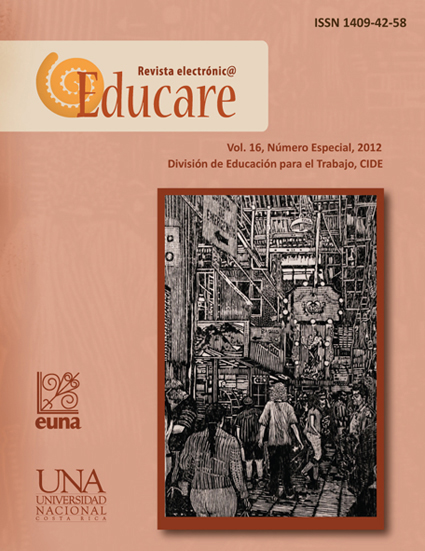Scanning Violence in the Construction of Subjectivity
DOI:
https://doi.org/10.15359/ree.16-Esp.4Keywords:
Violence, identity, children, family, group.Abstract
This paper provides an overview of the construction of subjectivity from an analytical-binding perspective. It explains how the inter-subjectivity of each individual is the result of interplay between inter-subjectivity and trans-subjectivity. It also explains how violence becomes part of the children’s identity when they grow up in a violent environment, at family or school, making them to reproduce the same kind of environment in the future.
References
Bernard, M. (1988a). Grupo interno transferencia horizontal y vertical (Maestría en estudios en
Psicología Grupal, clase 6). En UCI, Antología: Desarrollo a través de la cooperación (pp.
-23). Argentina: Instituto de psicoanálisis de las configuraciones vinculares.
Bernard, M. (1988b). Interacción entre grupo interno y grupo externo (Maestría en estudios en
psicología Grupal, clase 9). En UCI, Antología: Desarrollo a través de la cooperación (pp. 1-9).
Argentina: Instituto de psicoanálisis de las configuraciones vinculares.
Bernard, M. (s. f.). Historia del concepto de grupo interno. Enfoque sociológico, psicosocial y
psicoanalítico (Maestría en estudios en Psicología Grupal, Clase 5). En UCI, Antología:
Desarrollo a través de la cooperación (pp. 1-14). Argentina: Instituto de Psicoanálisis de las
Configuraciones Vinculares.
Kaës, R. (1995). El inconsciente y las alianzas inconscientes. Investigaciones para una
metapsicología de los conjuntos intersubjetivos (Cap. 7). En. R. Käes (Aut.), El grupo y el
sujeto del grupo: Elementos para una teoría psicoanalítica del grupo (pp. 287-338). Buenos
Aires: Amorrortu.
Krakov, H y Pachuc, C. (1998). Tres espacios psíquicos. En C. Pachuk y Friedler, R. (Coords.).
Diccionario de psicoanálisis de las configuraciones vinculares (pp. 445-450). Buenos Aires:
Ediciones del Candil.
L’ Hoste, M. L. (1998). Imaginario social. En C. Pachuk y Friedler, R. (Coords.). Diccionario de
psicoanálisis de las configuraciones vinculares (pp. 207-215). Buenos Aires: Ediciones del
Candil.
Lamovsky, C. (1998). Transmisión transgeneracional de las significaciones. En C. Pachuk y
Friedler, R. (Coords.), Diccionario de psicoanálisis de las configuraciones vinculares (pp. 441-
. Argentina: Editorial Del Candil.
Pichon-Rivière, E. (1985). Vínculo, comunicación y aprendizaje (Cap. 3). En E. Pichon-Rivière
(Aut.). Teoría del vínculo (pp. 47-56). Buenos Aires: Nueva Visión. Recuperado de http://
es.scribd.com/doc/89114552/Libro-Teoria-Del-Vinculo
Rojas, C. (1998). Violencia familiar. En C. Pachuk y Friedler, R. (Coords.), Diccionario de psicoanálisis
de las configuraciones vinculares (pp. 463-468). Argentina: Editorial Del Candil.
Downloads
Published
How to Cite
Issue
Section
License
1. In case the submitted paper is accepted for publication, the author(s) FREELY, COSTLESS, EXCLUSIVELY AND FOR AN INDEFINITE TERM transfer copyrights and patrimonial rights to Universidad Nacional (UNA, Costa Rica). For more details check the Originality Statement and Copyright Transfer Agreement
2. REUTILIZATION RIGHTS: UNA authorizes authors to use, for any purpose (among them selfarchiving or autoarchiving) and to publish in the Internet in any electronic site, the paper´'s final version, both approved and published (post print), as long as it is done with a non commercial purpose, does not generate derivates without previous consentment and recognizes both publisher's name and authorship.
3. The submission and possible publication of the paper in the Educare Electronic Journal is ruled by the Journal’s editorial policies, the institutional rules of Universidad Nacional and the laws of the Republic of Costa Rica. Additionally, any possible difference of opinion or future dispute shall be settled in accordance with the mechanisms of Alternative Dispute Resolution and the Costa Rican Jurisdiction.
4. In all cases, it is understood that the opinions issued are those of the authors and do not necessarily reflect the position and opinion of Educare, CIDE or Universidad Nacional, Costa Rica. It is also understood that, in the exercise of academic freedom, the authors have carried out a rogorous scientific-academic process of research, reflection and argumentation thar lays within the thematic scope of interest of the Journal.
5. The papers published by Educare Electronic Journal use a Creative Commons License:















 The articles published by Educare Electronic Journal can be shared with a Creative Commons License:
The articles published by Educare Electronic Journal can be shared with a Creative Commons License: 



